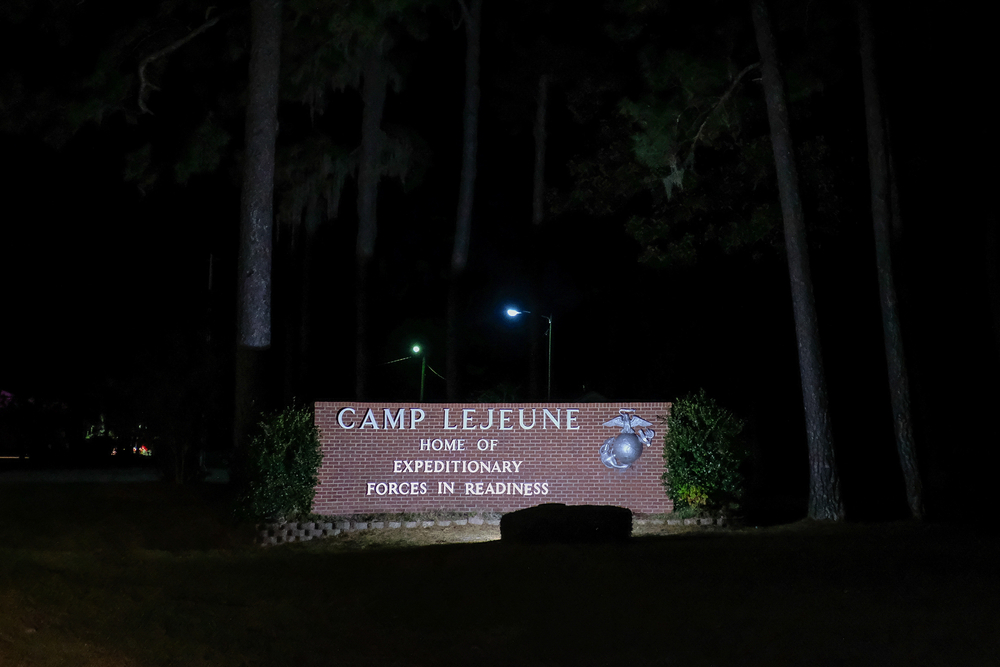Nearly 100,000 claims have been filed by military veterans, their families, and civilians who worked and lived at Camp Lejeune and later suffered injuries — but delays have affected the process. Military servicemembers and veterans aren’t typically allowed to sue the government. Instead, they must receive benefits through the U.S. Department of Veterans Affairs for any injuries sustained during military service. The Camp Lejeune Justice Act of 2022 (CLJA) allows toxic water victims to file Camp Lejeune lawsuits against the federal government for their injuries. The historic legislation signaled a victory for Camp Lejeune survivors, but the Navy didn’t settle any claims in the first six months after the law’s passing. Last month, the Department of Justice and the U.S. Navy announced a payout system to expedite payments for people sickened by Camp Lejeune's toxic water exposure.
The water supply at the North Carolina military base was contaminated for more than 30 years, and more than one million people unknowingly drank and bathed in toxic chemicals. Years later, many veterans and civilians have been diagnosed with severe health problems caused by chemical exposure. Documents show that the military knew about the contamination for years before the government shut down the water plants. The new Camp Lejeune Elective Option payment plan was designed to help water contamination victims who want justice receive payment for their injuries faster. However, not all Camp Lejeune-related injuries are included in the payout plan, and it’s still unclear how fast the payments will be made.
The Camp Lejeune health conditions are divided into tiered categories based on scientific proof linking them to chemical exposure. The first tier is for diseases with a proven link to Camp Lejeune toxic water exposure, and the second is for illnesses with a possible connection. Claimants with Tier 1 conditions are eligible for higher payouts up to $450,000; Tier 2 claimants can receive up to $400,000. Wrongful death claims are eligible for an additional $100,000. The money received depends on how long someone spent at Camp Lejeune.
Tier 1 Camp Lejeune Illnesses
The Agency for Toxic Substances and Disease Registry (ATSDR) has linked five illnesses to Camp Lejeune's toxic water. People with these conditions are entitled to the highest compensation in the Camp Lejeune Elective Option (EO) settlement offer.
Kidney Cancer
Kidney cancer is one of the most common cancers in the U.S. Doctors diagnose almost 82,000 new cases yearly, and it's more frequently found in men than women. When discovered early, most kidney cancer patients will survive, but treatment-related side effects include nerve damage and urinary incontinence.
Liver Cancer
Liver cancer is less common in the U.S. than in other countries, with only about 41,210 people diagnosed yearly. There are two forms of primary liver cancer: hepatocellular carcinoma, which occurs when a tumor grows on the liver, and cholangiocarcinoma, or cancer of the bile ducts. The five-year survival rate is only 17%.
Non-Hodgkin’s Lymphoma (NHL)
Non-Hodgkin's lymphoma is a cancer of the lymphatic system that primarily affects people older than 50 years old, and it is one of the diseases linked to Camp Lejeune exposure. NHL is one of the most common forms of cancer, with a long-term survival rate of 74%. NHL survivors may deal with long-term effects like osteoporosis and heart problems.
Leukemias
Leukemias are a group of cancers of the white blood cells that are often found in older adults. The 5-year survival rate is 65.7% and is, encouragingly, on the rise. Even someone who recovers from leukemia may have continuing complications. Infertility, cognitive issues, and lung problems are all treatment side effects.
Bladder Cancer
Bladder cancer is more frequent in men than women; the average person is diagnosed at 73. Early-stage bladder cancer is typically easy to treat, but the cancer often returns. Treatment options are often invasive and can cause permanent issues with incontinence and anemia.
Tier 2 Camp Lejeune Illnesses
The below diagnoses have been possibly linked to Camp Lejeune contamination. The Elective Option payment tiers aren't based on the severity of an illness but on the amount of evidence linking it to the chemicals found at Camp Lejeune.
Multiple Myeloma
Multiple myeloma is a cancer that affects plasma cells. It starts after plasma cells become cancerous and spread around the body. Multiple myeloma can cause low blood counts and calcium problems, making patients more susceptible to infection. The five-year survival rate is nearly 80%.
Parkinson’s Disease
Parkinson's disease is a central nervous system disorder affecting over 10 million people worldwide. It is a degenerative disease that worsens over time, and no known cure exists. People living with Parkinson's have shorter lifespans than people without the condition, which can leave patients unable to walk or care for themselves.
Kidney Disease/End-Stage Renal Disease
Kidney disease ranges in severity. Essentially, someone is diagnosed with the condition when they have a diseased or damaged kidney. Some kidney disease patients may need organ transplants to survive. End-stage renal disease is the most severe form of kidney damage and happens when the kidneys are no longer functioning.
Scleroderma (Systemic Sclerosis)
Scleroderma is a group of rare diseases primarily affecting women between 30 and 50 years old. These conditions involve the hardening and tightening of the skin and can also lead to organ damage and blood vessel problems. There is no cure for scleroderma, which can drastically decrease life quality.
Navigating the Camp Lejeune Elective Option Settlement
The rollout of the Elective Option payout plan has many wondering whether they would benefit from the new offer. Those who didn't spend much time at Camp Lejeune or want payment for a qualifying condition without filing a lawsuit might choose to accept an offer from the government. But for others, a Camp Lejeune lawsuit may yield more compensation in the long run. Talking to a Camp Lejeune lawyer is the best way to determine how to proceed with your case.













